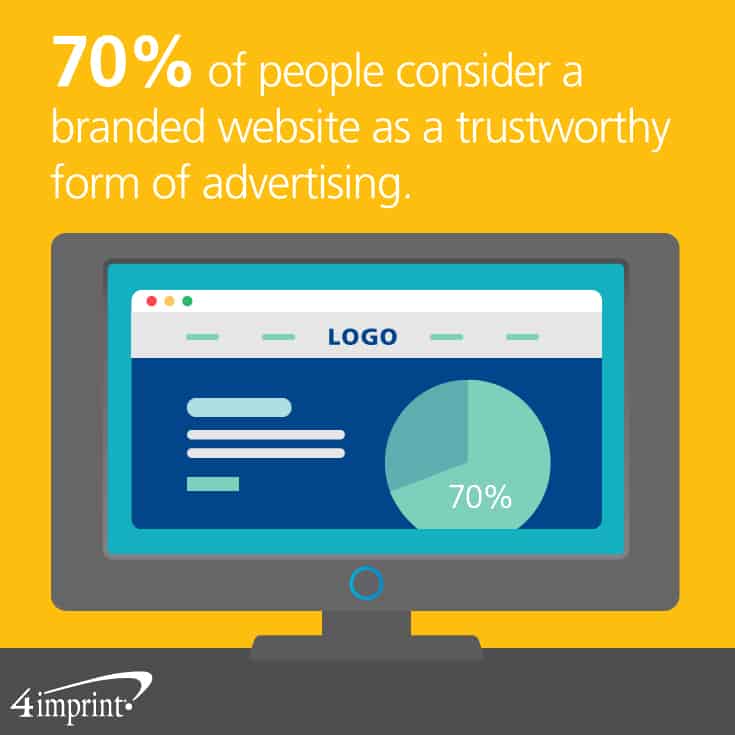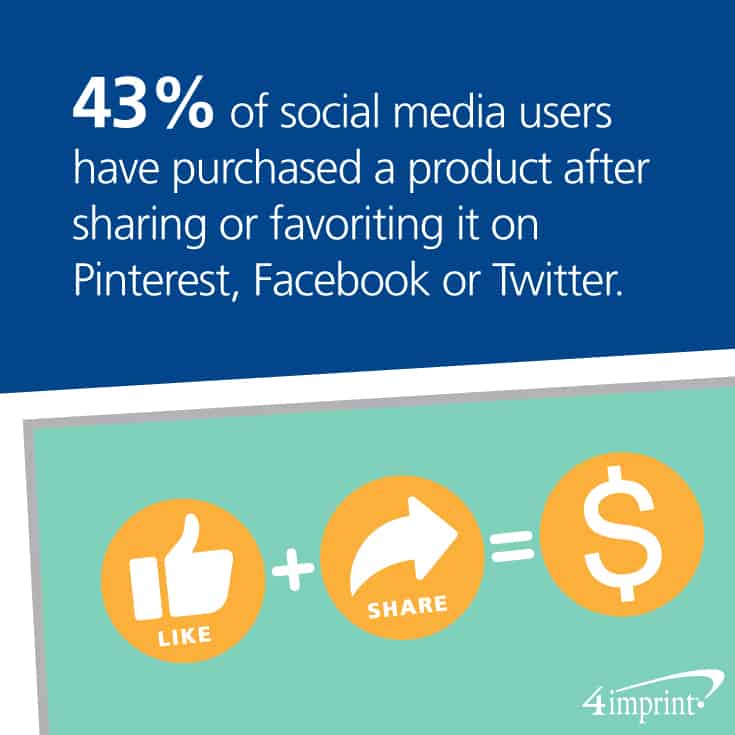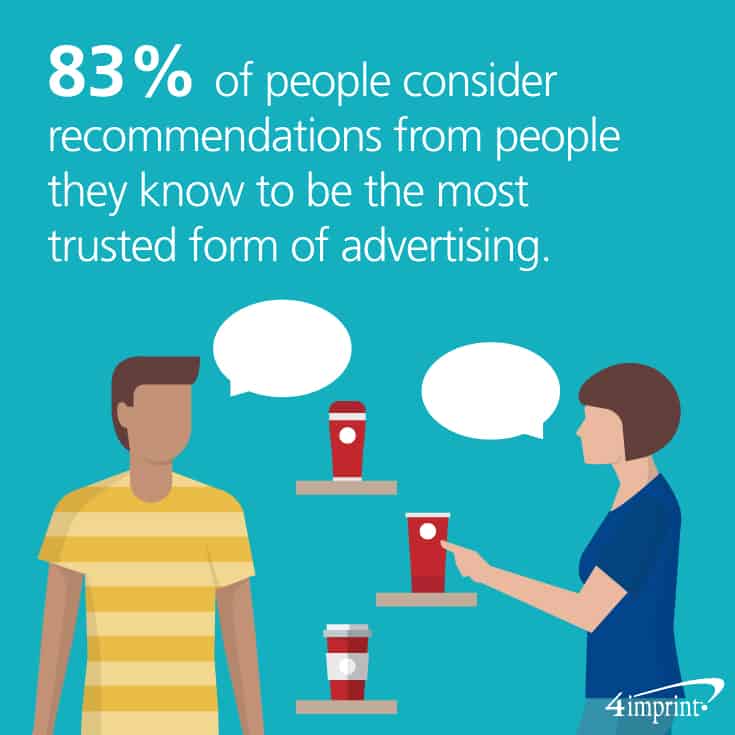Coming up with referral marketing strategies may sound like a large and complicated topic. But, in essence, it comes down to one simple question:
“Hey, do you know a company that (fill in the blank)?”
When it comes to building a business, you want to hear two possible answers:
“I do know a company, and it’s great!”
Or
“I know of a company, and I’ve heard really good things.”
“I know a company” is an experience-based referral while “I know of a company” is a reputation-based referral. In this Blue Paper, we discuss referral marketing strategies that will get people talking positively about your business. Whether you’re a big business, a small company or a one-person operation, these strategies will help bring new referrals to your door! Plus, we’ll provide ideas for referral thank you gifts to show much you appreciate their kind words.
Start small
It might sound obvious, but the best place to start with your referral marketing strategy is to make sure people know what you do. Ultimately, referral marketing comes down to people knowing who you are and what you can do for them. They also need to know that you provide excellent service.
The good news is this is something you’re already doing. Whether it’s having a clean store, well-trained employees or a solution to a difficult problem, providing a great service or product is always going to earn you excellent referrals, which will help build your business.
Reputation-based referrals: Websites are key
There are a lot of ways to get your name out there, including advertising, press releases and trade shows. But a great deal of your reputation-based referrals will, ultimately, come through your website. According to a Nielsen study, 70 percent of respondents consider a branded website a trustworthy form of advertising. The only more trusted form of advertising is a recommendation from someone the person knows.

In other words, your website needs to help you bring in referrals.
Make sure your website demonstrates your expertise
Aside from telling people who you are and what you do, a website needs to demonstrate your expertise. A National Association of Certified Valuators and Analysts study (PDF) found that “visible expertise” was the factor most likely to increase the probability of referrals.
What that means is you need to find ways to show you’re an expert in your area of business. The NACVA study found that the following five items made up over 70 percent of a business’ visible expertise:
- Showcasing successful, high-profile projects: If you’re doing great work, find ways to show it off. Get permission from your customer to take pictures of your handiwork or ask for testimonials. Ask customers to share how your consultations, services or products improved their bottom line.
- In-house experts: Let your experts demonstrate what they do best. Find ways to share your company knowledge or show off your product by being part of a panel, giving a demonstration, or offering to present at conferences or trade shows.
- A professional looking website: You keep your workplace clean and organized, right? Your website is no different. It should be up-to-date, easy to navigate and functional, even on mobile devices. Your website should also reflect who are as a company, such as being professionally conservative or fun and quirky.
- Be at the forefront of industry trends: Show you know what’s on the cutting edge of your industry. For example, if you build houses, talk about the newest updates to wiring codes or the latest interior design trends.
- Generating quality, educational content: There are multiple ways to do this, including blogging, creating white papers or putting together videos that demonstrate your product or address common topics in your industry. Showing that you know your topic and can solve your customer’s problems will serve as an excellent referral source for your business.
Chat with people on social media
This can be a simple and fun way to get your company noticed. Small businesses often post information about special deals, new innovations or changes in the company. Many business leaders also will answer questions online.
According to a study by Vision Critical, “43 percent of social media users have purchased a product after sharing or favoriting it on Pinterest®, Facebook® or Twitter®.”

Even major corporations find fun ways to use social media to gain brand recognition. Kentucky Fried Chicken® set up its account to follow only the five Spice Girls and six men name Herb—a reference to their secret recipe of 11 herbs and spices. The company then gave a personalized painting to the first person who noticed this fact.
While you might not be able to do something quite that elaborate, engaging your customers in a positive, upbeat way on social media can keep your name top of mind when buyers look for services you provide. Moreover, having a social media presence allows people to click “share”—and just like that, they’ve provided a personal referral.
Don’t forget to ask!
Asking satisfied customers to post online reviews will go a long way toward building your business. Studies show 73 percent of consumers find a business more trustworthy if they have positive reviews.
Oftentimes, it helps to set up a win-win-win cycle when it comes to referrals. For example, offer your customer a discount if they make a referral that leads to a sale. Also give a discount to the person getting the referral. This makes both the sender and the receiver happy, as they get a deal; and it makes you happy, as you get a new customer. Did you just get an email from a satisfied customer? Ask for permission to place it on your website and in other marketing materials. Ask people to share your information using a referral button on your website or by liking and sharing your social media content.
Experience-based referrals: Getting people to recommend you
This brings us back to experience-based referrals. Or, as stated before, “I know a company…”
According to a study by Nielsen, 83 percent of respondents listed “recommendations from people that I know” as the most trusted form of advertising.

Nurture your best referrals
In an ideal world, customers would talk about their great experience on social media and tell 10 friends how happy they are with your service. In reality, according to Zendesk, people share a good experience with five or more people 33 percent of the time and are much more likely to share a bad experience than they are a good one.
So how do you become part of the 33 percent?
- Make it easy: If you sell products online or via an app, make sure people can rate or share the experience immediately after purchasing. Even non-profits are able to raise their profile within the community by giving people who donated the opportunity to click a share button to let their social media followers know who they’re donating to and why.
- Make it fun: Many companies now go out of their way to make their products fun to share on social media. Trunk Club®, for example, took a simple premise—shopping for clothes online—and made it fun by packing their boxes as artfully as possible. Subsequently, people share pictures of their purchases on social media and even create unboxing and try-on videos. Other companies have a special hashtag to provide discounts to customers who post pictures with their products.
- Make it worth their while: Much like online referrals, person-to-person referrals generally happen more often in win-win-win situations, whether by providing discounts, deals or referral thank you gifts. If there is one particular customer bringing in a lot of business for you, consider showing your appreciation with a Cookie and Brownie Basket or a branded Crossland® Fleece Jacket.
Use promotional products to get your name seen
Oftentimes, promotional products used in fun, useful or intriguing ways can function as a referral.
Mortgage Adviser Nick Dolata and his coworkers at Peoples Home Equity use a Wooden Nickel – Free Cup Coffee as a conversation starter. It serves as an instant referral. A customer wants to know what the wood nickel is for and subsequently gets into a conversation with the person passing them out.
With Dolata’s name and cell phone number on one side, and the offer for a free cup of coffee on the other, the nickel serves a dual purpose. “A business card is the formal introduction, whereas a wooden nickel is more of a fun introduction,” Dolata said. “I use them at open houses, when meeting with clients or when speaking to people looking for homes. Instead of just offering someone a cup of coffee, I give them a token, and tell them to call me to meet up for a cup of coffee or a drink so we can continue the conversation.”
Rachel Burbanks, the PR specialist for Shepherd’s Cove Hospice, noted that an affordable giveaway, like the Value Grocery Tote can have a lot of value simply because the quality of the bag is so high. “We give them away at networking events because they’re an impressive bag, and people love them,” Burbanks said. “We want to have the best bag, the bag people put all their other bags and promo items into.”
Burbanks feels like the quality of the bag also reflects well on the quality of the work Shepherd’s Cove performs. “A bag might seem like a little thing, but giving someone a quality bag is showing them the quality of our service,” Burbanks said. “We see the bags come back in the hands of our volunteers, and even at other networking events.”
By giving people a quality item with highly visible branding, the bag ends up being seen a lot, essentially serving as a miniature billboard in the community. And, of course, items can be useful and be a talking point at the same time.
Sharley Hamm, the marketing director of Garner Dental Group, found great ways to use the Adhesive Cell Phone Wallet and other gifts when it came to clients and referrals.
“The cell phone wallets were a suggestion from one of our patients,” said Hamm. “We keep them out on the front counter, and tell anyone that wants one to please take one. Our patients love them because they’re so unusual, and useful as well. It gets them talking. It’s the kind of thing they might show off when out to lunch with friends.”
Hamm also spoke about other ways they use referral gifts in their office. “We keep gifts on hand to give to our clients who have extensive work done, or who have given a personal referral. We also ask them to please leave us reviews online,” she said. “And we try to give gift baskets to other companies who send business our way. For example, I’ve put together thank-you gift baskets for pediatricians who send us patients that require extensive root canal work.”
The terrific thing about promotional products? The original owner keeps and uses it or gives it away to a friend, allowing the gift to serve as a referral for years to come.
Find a business you love, then trade referrals
According to a referral marketing study by NACVA, the more referrals you give, the more you get (PDF). Often, partnering with another business related to yours can help both of you get more referrals, and therefore, more customers.
For example, a lot of plumbers will work in conjunction with a company that does tree trimming and stump grinding, since root systems are a frequent source of pipe damage, with each business recommending the other as the need arises.
And ultimately, it really is that simple. If you know a good business, especially if it’s related to your product or service in some way, get in touch with them and offer to trade referrals.
Putting your referral marketing strategies into play with referral thank you gifts
Ultimately, picking the best referral marketing strategies along with referral thank you gifts goes back to knowing what your business does best and making sure your website and customer interactions reflect positively on your brand. Make sure potential customers know where your expertise is and provide excellent customer service. And always remember to tell your customers: “If we served you well, tell your friends!”

